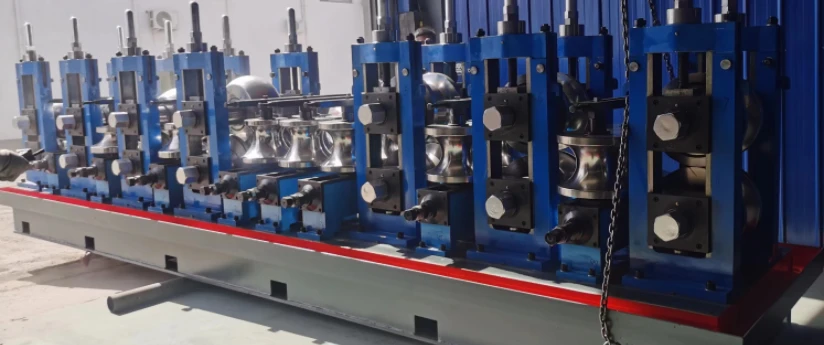Advanced High-Frequency Welding Machines for Efficient Pipe Fabrication
High-Frequency Pipe Welding Machines Revolutionizing the Welding Industry
In the ever-evolving landscape of manufacturing and construction, the demand for high-quality, efficient welding solutions has never been greater. Among the innovative advancements in this field is the high-frequency pipe welding machine. This technology is not just a boon for pipe industries but a transformative force that enhances productivity, ensures superior weld quality, and promotes safety.
What is High-Frequency Pipe Welding?
High-frequency pipe welding, also known as high-frequency induction welding (HFIW), is a process that utilizes high-frequency electrical currents to heat and join metal pipes. This technique is particularly advantageous for producing longitudinal seams on various types of pipe, including carbon steel, stainless steel, and other alloys. By applying high-frequency currents, the process creates a localized area of heat, allowing the edges of the pipe to fuse together without the need for additional filler materials.
The process starts with the preparation of the pipe edges. Once the edges are aligned, high-frequency currents are passed through them, generating heat primarily at the surface, where the material has a lower mass. As the pipe edges reach the appropriate temperature, they are pressed together, forming a strong, cohesive bond. This method stands out due to its speed, efficiency, and the high quality of the resulting welds.
Advantages of High-Frequency Pipe Welding Machines
1. Speed and Efficiency One of the primary advantages of high-frequency welding is its speed. The process can significantly reduce welding times compared to traditional methods, allowing for faster production rates. This efficiency is crucial in industries such as oil and gas, where timely completion of projects can lead to substantial cost savings.
2. Quality of Weld The high-frequency welding process produces clean, strong welds with minimal spatter and distortion. This quality is attributable to the controlled heating and cooling cycles, which reduce the risk of warping and structural weaknesses in the welded areas. The resulting welds often surpass the mechanical properties required for high-stress applications.
3. Versatility High-frequency pipe welding machines are capable of handling a wide variety of materials and pipe sizes. This versatility opens up new possibilities for manufacturing industries, enabling the production of pipes for various applications, including petrochemical, construction, and automotive sectors.
high frequency pipe welding machine

4. Reduction of Heat-Affected Zones Unlike traditional welding methods that can create extensive heat-affected zones (HAZ), high-frequency welding limits this area. This characteristic is vital for maintaining the integrity of the material, preserving its mechanical properties and preventing issues like cracking or hardening.
5. Eco-Friendliness As industries increasingly focus on sustainability, high-frequency welding machines offer an environmentally friendly alternative. The reduced energy consumption and minor waste generation make this technology a preferred choice for modern manufacturing processes.
Applications of High-Frequency Pipe Welding Machines
High-frequency pipe welding machines find applications in various industries, notably
- Oil and Gas For the production of pipelines and tubing. - Construction To manufacture structural steel pipes and components. - Water and Waste Management In the production of pipes for water supply and sewage systems. - Automotive For producing exhaust systems and other tubular components.
Conclusion
As the industrial landscape continues to evolve, high-frequency pipe welding machines represent a significant advancement in welding technology. Their ability to produce high-quality welds quickly and efficiently makes them indispensable in modern manufacturing processes. As industries increasingly prioritize speed, strength, and sustainability, embracing high-frequency welding is not just a trend; it's a strategic advantage.
With continuous innovations and improvements, the future of high-frequency pipe welding technology looks promising. Manufacturers who invest in this cutting-edge equipment can expect not only enhanced productivity but also higher quality outputs, ultimately leading to greater satisfaction for clients and stakeholders alike. As we move forward, the integration of advanced welding solutions will play a critical role in the success of various sectors, driving progress and establishing new benchmarks in quality and efficiency.
-
High Frequency Straight Seam Welded Pipe Production Line|BzZhou Xinghua|Precision Welding&EfficiencyNewsJul.30,2025
-
High Frequency Straight Seam Welded Pipe Production Line - BzZhou Xinghua|Precision Engineering&EfficiencyNewsJul.30,2025
-
High-Frequency Straight Seam Welded Pipe Production Line-BzZhou Xinghua Machinery Equipment Manufacturing Co., LTD.NewsJul.30,2025
-
High-Frequency Straight Seam Welded Pipe Production Line-BzZhou Xinghua Machinery Equipment Manufacturing Co., LTD.|Precision Manufacturing, High EfficiencyNewsJul.30,2025
-
High Frequency Straight Seam Welded Pipe Production Line-BzZhou Xinghua Machinery Equipment Manufacturing Co., LTD.|Precision Steel Pipe Manufacturing&Industrial EfficiencyNewsJul.29,2025
-
High-Frequency Straight Seam Welded Pipe Production Line-BzZhou Xinghua Machinery Equipment Manufacturing Co., LTD.|Precision Steel Pipe Manufacturing&Industrial EfficiencyNewsJul.29,2025


